Summary of committee site visits related to the inquiry
This appendix contains summaries of the committee's visits
to:
-
IRT College in Wollongong, New South Wales, on 6 March 2017;
-
Juniper Guwardi Ngadu Residential Care, Halls Creek Community
Care, and Halls Creek People's Church Aged Care Facility in the Kimberley
region, Western Australia (WA) on 8 June 2017; and
-
Southern Cross Care in Broome, WA, on 9 June 2017.
Site visit to IRT College,
Wollongong NSW
Introduction
On 6 March 2017, Senators Siewert, Duniam and Polley
travelled to Wollongong NSW and participated in a site visit to IRT College.
IRT College is a Registered Training Organisation (RTO)
operated by IRT Group, which provides accredited and non-accredited aged care,
home and community care and other community service courses that have been
developed by industry specialists.
IRT College has been operating since 2012, and is based in
Wollongong. IRT College also offers online courses to meet flexible learning
needs. In the 2015-16 financial year IRT offered 24 full qualification courses,
including Certificate III courses in Aged Care, Home and Community Care.[1]
A total of 280 students enrolled in full qualification courses in 2015-16.[2]
In February
2016 IRT College launched a pilot traineeship program to encourage young people
to join the aged care sector. Sixteen year 11 students were employed as
trainees in the two-year training program, and will gain a nationally
recognised qualification and paid employment for a minimum of 700 hours.[3]
During the site visit, the Senators had the opportunity to:
-
Meet and talk to some of the College's trainers and students and
gain a more in-depth understanding of the College's training programs and
people, as well as the regional challenges.
-
See the College's demonstration equipment in action.
-
Road test new technology for use in residential aged care and
home care. This included technology currently under deployment, as well as new
technologies still under research and evaluation.
Site visit to Juniper Guwardi Ngadu
Residential Care
Senators Siewert, Dodson and Reynolds participated in the
three site visits held in WA on 8 June 2017.
Introduction
On 8 June 2017 the committee travelled
to Juniper Guwardi Ngadu Residential Care (JGNRC) in Fitzroy Crossing, WA to
conduct a site visit. The committee was welcomed at the airport, transported to
JGNRC and provided with a tour by Ms Elvira Even, Facility Manager at JGNRC. JGNRC
provides residential care services, respite care for up to four weeks, and a
bus service to provide residents transport to participate in community
activities and cultural observances, such as 'sorry business'. JGNRC also
provides catering for meals on wheels services under the Home and Community
Care program.
Description of the facility
Juniper Guwardi Ngadu Residential Care consists of 10
residents' rooms which can accommodate up to three residents per room, allowing
for 23 residents in total. The facility consists of a ring of buildings built
around a central courtyard and communal eating and activity areas which
includes some undercover and seating areas and a fire pit. The buildings
surrounding this area consist of:
-
residential rooms where the residents live;
-
a common amenities area with a kitchen and laundry;
-
an activities centre with art supplies; and
-
an administrative area with staff offices.
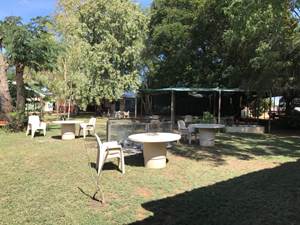
Figure 1.1 & 1.2 (from
left to right): View of the central outdoor area, including fire pit; and view
of residents' room.
Facility staff
JGNRC employs 28 staff, including eighteen multi-skilled
care staff, a registered nurse/clinical care coordinator (full-time), three
enrolled nurses, a cook and kitchen hand staff. JGNRC also has casual employees
who it uses to fill gaps in the roster.
Specialists, such as a dietitian and podiatrist, also visit
the facility approximately once per month. The vision van visits the local
hospital, which residents are transported by JGNRC to access. The local WACHS
hospital does not provide allied health services for the residents at JGNRC.
Staff accommodation is limited, with three staff members
living on-site in beds in the facility (it was pointed out that these could be
used for further respite if there was more appropriate staff accommodation) and
a further eight staff living in the workers camp, which is located approximately
2.5 kilometres away from the facility. JGNRC is currently in the process of
seeking approval to build staff accommodation that will house up to 12 staff
(including couples) on a block adjoining the facility. Such accommodation would
free up beds in the facility, providing up to eight additional beds for community
respite.
Facility residents
Residents at JGNRC ranged in age from 28 years and above. All
residents are from the Fitzroy Valley, but come from five different Aboriginal
and Torres Strait Islander language groups.
Art plays an integral part of the residents' daily lives,
with six residents being world renowned artists. The local arts centre,
Mangkaja Arts, displays work by several of the residents, and provides JGNRC
with art supplies so that residents can create their artworks. Residents can
also visit the arts centre and complete artwork there, and participate in
educational activities, such as showing their artwork to school students who
visit the centre.
Two of the residents also participate on the local radio
station, and are provided with transport by JGNRC to do that.
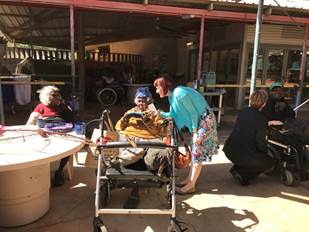
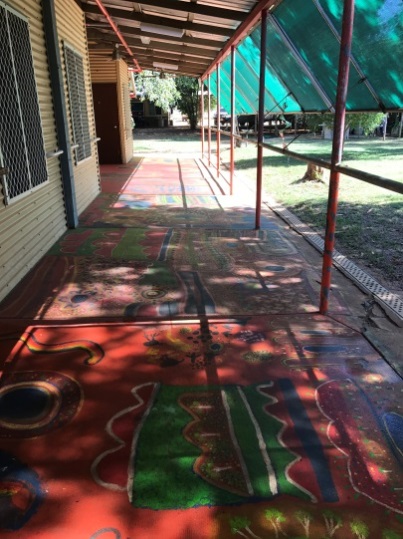
Figure 1.3 & 1.4 (from
left to right): Senator Siewert speaks to residents and artists about the
baskets they are creating, while Senator Reynolds speaks with Leslie who
participates on the local radio station; and image of former residents' art on
one of the pathways in the facility.
Key challenges for the facility
During the tour, staff members of JGNRC told the committee
about the key challenges JGNRC faces in attracting and retaining qualified
staff, including:
-
lack of appropriate staff accommodation;
-
lack of adequate funding to support staff with the costs
associated with living in a remote area; and
-
geographical issues associated with living and working in a
remote area – including difficulty attracting workers who want to stay
long-term.
JGNRC staff noted that it is particularly difficult to
attract staff during the 'wet season' when temperatures are high and the
community is effectively 'cut-off' for a period of time.
Acknowledgments
On behalf of the committee, Senator Siewert explained to the
staff and residents at JGNRC the purpose of the committee's visit and thanked
them for warmly hosting the committee.
Site visit to Halls Creek Community
Care
Introduction
Following the committee's visit to Juniper Guwardi Ngadu
Residential Care on 8 June 2017, the committee travelled to Halls Creek
Community Care (HCCC) in Halls Creek, WA to conduct a site visit. The committee
was welcomed at the airport, transported to HCCC and provided with a briefing
by Ms Kaye T Rangitutia, Coordinator, and staff of HCCC.
Services provided by HCCC
HCCC provides a range of services to people living in and
from surrounding areas of Halls Creek, including:
-
meals on wheels;
-
transport;
-
assistance with shopping;
-
washing/laundry services;
-
showering; and
-
social support.
In addition to these services, HCCC also hosts activities,
including picnics, barbeques and bus trips.
Clients can access up to three days of support at HCCC, and
two days home care per week. Clients can also receive meals on wheels packages
five days per week.
HCCC's on-site facility consists of:
-
an administrative area with a main office and kitchen;
-
toilets, shower and laundry amenities;
-
an outdoor communal area; and
-
storage space for art supplies and games/jigsaw puzzles.
HCCC also has two vehicles, a bus and a car, which it uses
to transport clients.
HCCC staff
At the site visit, the committee had the opportunity to meet
five of HCCC's key staff members (pictured below). HCCC employs staff from a
range of culturally and linguistically diverse backgrounds, including employees
from Australia, New Zealand, and Fiji.
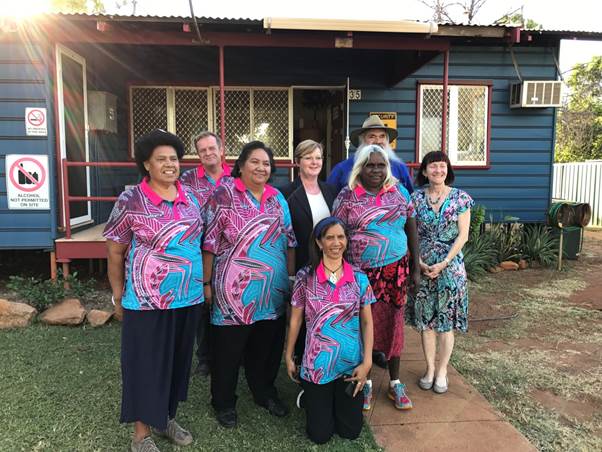
Figure 1.5: Photo of
Senator Siewert, Senator Dodson, and Senator Reynolds with HCCC staff (from
left to right) Ms Penaisia (Patsy) Burton, Mr Peter Jenkins, Ms Kaye T
Rangitutia, Ms Leanne Reynolds and Ms Eileen Lightning outside the main office.
HCCC clients
At the time of the visit, HCCC was providing residential support
services to approximately 23 people in Halls Creek. Such services included
meals on wheels, assistance with transport, shopping and banking and home
cleaning services, for example.
HCCC's clients come from four different Aboriginal and
Torres Strait Islander language groups and range in age from 18 years up to
about 75 years.
Key challenges
for HCCC
During the briefing HCCC told the committee about the key
challenges it faces in providing quality care to aged care clients in Halls
Creek, including:
-
lack of coordinated access to allied health professionals,
particularly occupational therapists, speech therapists and dentists, and lack
of monitoring of clients with chronic health conditions, such as diabetes;
-
difficulty attracting appropriately skilled and qualified workers
that possess the adequate life experience, and practical and communication skills
to do the job; and
-
difficulty obtaining timely Aged Care Assessment Team (ACAT)
assessments.
During the briefing, HCCC told the committee that timely
ACAT assessments are difficult to obtain as an assessor only comes to Halls
Creek once per month. This creates difficulties for HCCC in providing quality
care, and means some clients go without crucial support (such as walking
frames) until an assessment can be done. In some instances assessments are carried
out over the phone by the Regional Assessment Service team based in Broome.
HCCC also told the committee that it has recently applied to
be a registered provider for the National Disability Insurance Scheme (NDIS),
as there is a gap in disability support in Halls Creek, with no registered NDIS
providers. If successful, this would enable HCCC to expand some of the services
it already provides to some of its clients.
HCCC is in the process of establishing a small team to start
to provide aged care services to Yiyili, a remote community that is not currently
receiving any services. It became apparent during the discussion that there are
a number of remote communities where elderly residents are not receiving aged
care services.
Visit to Yarliyil Arts Centre
Following the briefing, Peter, bus driver and support worker
at HCCC, drove the committee to Yarliyil Arts Centre so that the committee
could view some of the artwork created by some of its Aboriginal and Torres
Strait Islander clients in the local community and better understand the
important role art centres play for Aboriginal and Torres Strait Islander
people in aged care.
HCCC told the committee that the arts centre has a
significant role in aged care in maintaining culture and connection to
community and country.
At the arts centre the committee learnt about a project that
is currently underway to boost the morale and reputation of the Halls Creek
Community. The project involves the painting of old car bonnets and rubbish
bins which will be placed around Halls Creek, and is aimed at attracting tourists
and improving the image of Halls Creek. Staff at the arts centre told the
committee that numerous Aboriginal and Torres Strait Islander peoples utilise
the facilities and have their artwork displayed at the centre.
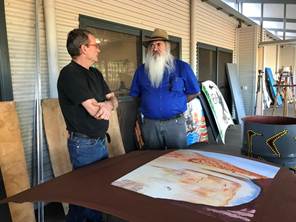
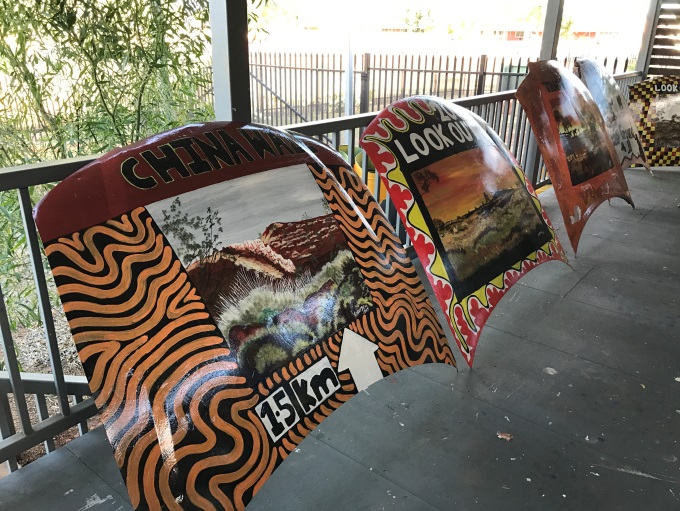
Figure 1.6 & 1.7 (from
left to right); Senator Dodson speaks to the manager of the Yarliyil Arts
Centre about the centre's current community project; and photo of some of the
artworks which will be placed around Halls Creek.
Acknowledgments
On behalf of the committee, Senator Siewert thanked the HCCC
staff for warmly hosting the committee's visit.
Site visit to Menkawum Ngurra, Halls
Creek People's Church Aged Care Facility
Introduction
Following the committee's visit to Halls Creek Community
Care on 8 June 2017, the committee travelled to Menkawum Ngurra, Halls Creek
People's Church Aged Care Facility (Halls Creek ACF) in Halls Creek, WA to
conduct a site visit. The committee was welcomed and provided with a briefing
and tour by Ms Patricia Williams, Facility Manager at Halls Creek ACF. Halls
Creek ACF was established in 1978 and provides residential care and respite
care to aged and people with disability in the Shire of Halls Creek.
Description of the facility
Halls Creek ACF consists of a 28 bed facility. At the time
of the visit, Halls Creek ACF had 21 permanent residents, the majority of which
were high care patients.
The facility consists of:
-
residential rooms where residents live;
-
an outdoor communal area in the centre of the facility which
includes a fire pit;
-
a kitchen and dining area; and
-
an administrative area with staff offices.
The residential rooms accommodate up to two people, and
consist of female or male only rooms.
Facility residents
Residents ranged in age from 40 years up to 104 years, and
came from a diverse range of Aboriginal and Torres Strait Islander language
groups.
Training initiatives
During the briefing Halls Creek ACF staff told the committee
about its partnership with the local TAFE which focuses on training local
Aboriginal and Torres Strait Islander peoples in aged care. Loretta Andrew, the
local TAFE coordinator, told the committee that 23 students had recently
completed their Certificate III in Individual Support through the partnership
initiative and would soon be graduating. The course students undertook through
the TAFE included training in 13 core areas of competency, including dementia
care. Students also completed a total of 120 field hours in order to qualify
for graduation.
Key challenges for Halls Creek ACF
During the briefing Halls Creek ACF staff told the committee
about the key challenges it faces in attracting and retaining workers, and
providing quality care to aged care clients in its facility, including:
-
lack of appropriate accommodation for staff;
-
lack of resources to provide upgrades to the facility and
purchase additional equipment (such as lifting hoists); and
-
difficulty attracting and retaining staff due to low rates of
remuneration coupled with the additional expenses associated with living in a
remote area.
A major concern for aged care staff in Halls Creek appeared
to be access to secure accommodation, safety and adequate remuneration to pay
for the higher cost of living expenses associated with living in a remote area.
To assist with these costs, Ms Williams told the committee that Halls Creek ACF
provides staff with subsided daily lunches and food hampers once per fortnight
(with costs deducted from staff wages).
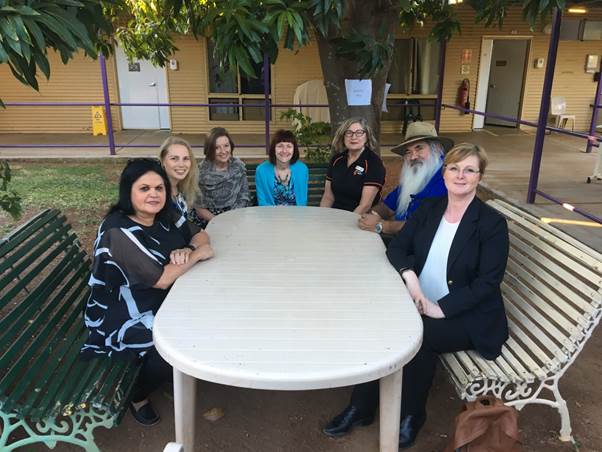
Figure 1.8: Photo of
Senator Siewert, Senator Dodson, Senator Reynolds and Secretariat staff, Ms
Jeanette Radcliffe and Ms Amelia Hurd with Facility Manager, Ms Patricia
Williams, and TAFE Lecturer, Ms Loretta Andrew, seated in a communal area at
Halls Creek ACF.
Acknowledgments
On behalf of the committee, Senator Siewert thanked Halls
Creek ACF staff for warmly hosting the committee's visit.
Site visit to Southern Cross Care,
Germanus Kent House
Introduction
Prior to the committee's public hearing in Broome on 9 June
2017, the committee travelled to Southern Cross Care (SCC) in Broome, WA to
conduct a site visit. The committee was welcomed and provided with a briefing
and tour by Mr Nick McGregor, Manager at SCC. Senators Siewert, Dodson, Pratt
and Reynolds participated in the site visit.
SCC provides residential care and respite care through
Germanus Kent House as well as Home and Community Care (HACC) services and
packages through Southern Plus and the co-located Bran Nue Dae Centre.
Description of the facilities
Germanus Kent House
Germanus Kent House is a residential aged care facility that
provides accommodation and support for up to 55 residents. It also offers short
term respite accommodation ranging from one day to a number of weeks.
At the time of the visit that facility had 48 permanent residents
and three residents in respite.
Bran Nue Dae
Bran Nue Dae is a co-located facility that provides day
centre activities and a breakfast club. SCC transports, showers and administers
medication to clients as part of the breakfast club.
The facility also provides 150 packages, including HACC
packages, and provides meals on wheels services seven days a week.
The facilities consist of:
-
residential rooms where residents live;
-
an indoor and outdoor dining area;
-
an activities room with art and craft supplies;
-
an outdoor courtyard area with a pergola and fire pit;
-
a Chapel;
-
indoor communal areas;
-
a vegetable garden; and
-
an administrative area with a reception and staff offices.
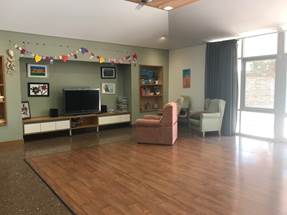

Figure 1.9 & 1.10
(from left to right): photo of indoor communal area; and view of outdoor
communal area, including fire pit where family members can come and visit
residents and participate in ceremonial activities.
Facility staff
SCC employs a total of 6 staff in its facility, and 14 staff
in Community. During the briefing Mr McGregor told the committee that the
facility has difficulty attracting adequate numbers of staff to cover shifts,
especially during the 'wet season'. To boost its workforce during the wet
season, SCC relies on a mix of casual staff and migrant workers with varying
areas of expertise (such as personal care, and social work).
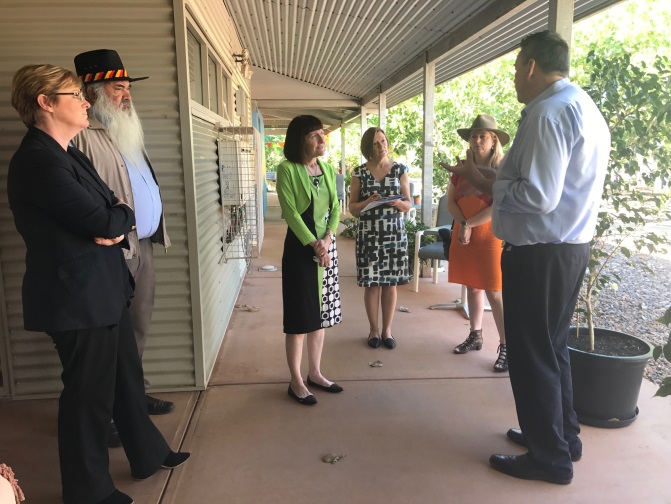
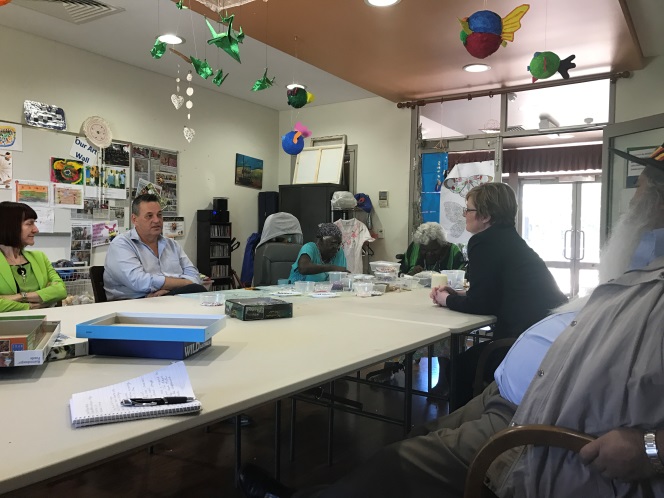
Figure 1.11 & 1.12
(from left to right): Senators Siewert, Reynolds, Dodson and Pratt, and Ms
Jeanette Radcliffe, committee Secretary, speaking to Mr Nick McGregor, Manager;
and Senator Siewert, Senator Reynolds and Senator Dodson speaking with staff
and residents in the activity room.
Facility residents
The majority of residents are from Aboriginal and Torres
Strait Islander backgrounds (variably representing 50 to 70 per cent of
residents), and are aged anywhere above 40 years. As well as aged care
residents, the facility also accommodates a number of people with disability and
persons with an acquired brain injury (ABI). Mr McGregor noted that the
facility cares for a larger than usual number of residents with an ABI.
Residents are able to access 52 days leave per year to
return to country and participate in cultural observances such as 'sorry business'.
Key challenges for SCC
During the briefing SCC told the committee about the key
challenges it faces in attracting and retaining workers, and providing quality
care to aged care clients in its facility, including:
-
lack of appropriate and affordable accommodation for staff;
-
lack of incentives for staff to stay long-term (climate and high
cost of living mean staff are more attracted to working in urban areas);
-
lack of training and continuing professional development for
staff, including
- lack of training for registered staff to meet specialised areas
of care;
-
lack of on-site post-graduate courses; and
-
lack of avenues for enrolled nurses to become registered nurses
locally.
Acknowledgments
On behalf of the committee, Senator Siewert thanked SCC
staff for warmly hosting the committee's visit.
Navigation: Previous Page | Contents